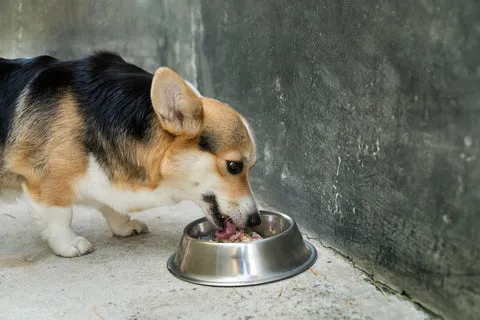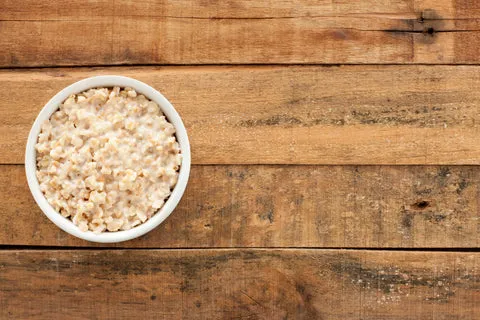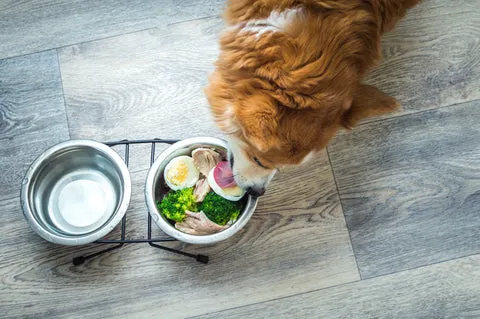When dogs are feeling well, they typically exhibit a robust appetite. However, a sudden loss of interest in food can be a tell-tale sign of an underlying issue, often an upset stomach. Just like humans, dogs can experience digestive discomfort, making it challenging for pet owners to know what to offer them when their regular meals are no longer appealing. Providing appropriate, nutritious food during these times is crucial for boosting their energy levels and supporting a swift recovery.
At Dog Care Story, we understand the worry that comes with a sick pet. This comprehensive guide, informed by expert knowledge in canine health and nutrition, will outline the best foods to give a dog with an upset stomach. We’ll also delve into strategies for dogs prone to digestive issues or those with known food allergies, ensuring you’re well-prepared to help your beloved companion feel better. Understanding what your dog can and cannot eat is crucial for their overall health, especially when they have digestive issues. For more detailed information, explore our guide on what can my dog eat and not eat.
Understanding Your Dog’s Upset Stomach
A dog’s upset stomach can manifest in various ways, including vomiting, diarrhea, loss of appetite, lethargy, or a combination of these symptoms. Common causes range from dietary indiscretion (eating something they shouldn’t have), stress, changes in diet, parasites, or more serious conditions like infections or organ issues. While a mild upset stomach can often be managed at home with bland foods, it’s vital to know when to seek professional veterinary help. If your dog experiences persistent vomiting or diarrhea, severe lethargy, dehydration, abdominal pain, or any unusual symptoms, contact your vet immediately. Early intervention can prevent minor issues from escalating into severe health problems.
Top 10 Gentle Foods for Dogs with an Upset Stomach
When your dog is experiencing an upset stomach, a plain, bland diet is typically recommended. These foods are easy to digest, low in fat, and less likely to irritate their sensitive digestive system. Having these options on hand can help you quickly address your dog’s discomfort.
 A spoon serving raw frozen dog food, illustrating nutritious options for a dog with an upset stomach.
A spoon serving raw frozen dog food, illustrating nutritious options for a dog with an upset stomach.
Here are ten highly recommended, nutritious, and gentle food options for a dog with an upset stomach:
1. Boiled White Meat (Chicken or Turkey)
Plain, boiled white meat such as chicken or turkey breast is an excellent choice for a sick dog. It’s lean, easy to digest, and provides essential protein without excessive fat that could aggravate their stomach. Always remove any skin or bones before feeding to prevent choking and make it easier on their digestive system.
Preparation:
- Rinse the meat thoroughly under cold water.
- Remove all skin, bones, and excess fat.
- Place the meat in a pot and cover with water. Bring to a boil, then reduce heat and simmer for 15-20 minutes until thoroughly cooked.
- Drain the water and cut the meat into small, bite-sized pieces for easier digestion.
- Allow to cool completely before serving. You can serve it alone or mixed with white rice.
2. Plain White Rice
White rice is a staple in many bland diets for dogs with an upset stomach. While brown rice offers more nutritional value, the blandness and lower fiber content of white rice make it easier to digest for a sensitive tummy. It acts as a binding agent, which can be particularly helpful if your dog has diarrhea, helping to firm up their stools and normalize their digestive system.
 A Border Collie looking attentively at a bowl of bland white rice, a gentle food for dogs with an upset stomach.
A Border Collie looking attentively at a bowl of bland white rice, a gentle food for dogs with an upset stomach.
Preparation:
- Rinse the rice under cold water.
- Add the rice to a large pan, using a 2:1 water-to-rice ratio.
- Bring to a boil, then reduce to a simmer. Cover the pan and cook on low heat for about 18 minutes, or until all the water is absorbed. Avoid adding salt.
- Let it rest and cool, then fluff with a fork before serving.
3. Cooked Sweet Potatoes
Plain, cooked sweet potatoes are packed with vitamins, fiber, and essential minerals like calcium, iron, and magnesium, yet are incredibly gentle on the stomach. They are an excellent option for soothing your dog’s digestive tract.
 Sliced and cooked sweet potatoes, a beneficial high-fiber food for soothing a dog's digestive issues.
Sliced and cooked sweet potatoes, a beneficial high-fiber food for soothing a dog's digestive issues.
Never feed raw sweet potatoes, as they are hard to digest and can worsen stomach upset.
If you’re looking for more specific dietary advice for your canine companion, like what to give labrador to eat, remember that bland, easily digestible options are often recommended for sensitive tummies.
Preparation:
- Peel the sweet potatoes and chop them into chunks.
- Boil them in water until very soft.
- Drain the water and mash the potatoes thoroughly.
- Allow to cool before serving.
4. Plain Pumpkin
Similar to sweet potatoes, plain pumpkin is highly effective in helping a dog with an upset stomach feel better. It’s rich in vitamins that boost the immune system and full of fiber, which helps regulate digestion and can alleviate both diarrhea and constipation.
 A playful Husky with a pumpkin slice, highlighting pumpkin as a natural remedy for a dog's upset stomach.
A playful Husky with a pumpkin slice, highlighting pumpkin as a natural remedy for a dog's upset stomach.
You can give your dog 1-4 tablespoons of plain, canned pumpkin (not pumpkin pie filling, which contains sugar and spices) with their regular bland meal. Ensure there are no added sugars, spices, or other ingredients.
5. Homemade Bone Broth
Homemade bone broth is a nutritional powerhouse for sick dogs. It provides essential nutrients, minerals like sodium and potassium, and importantly, aids in hydration, which is critical when a dog is losing fluids through vomiting or diarrhea. It’s low in carbohydrates and easy to digest.
 A cute puppy enjoying homemade bone broth, a hydrating and gentle food option for dogs with an upset stomach.
A cute puppy enjoying homemade bone broth, a hydrating and gentle food option for dogs with an upset stomach.
Preparation:
- Add beef, pork marrow bones, or chicken/turkey bones to a large cooking pot.
- Cover with a few inches of water. Avoid adding garlic, onions, or excessive salt, as these can further irritate a dog’s stomach or be toxic.
- Cook on low heat for 20-24 hours.
- Once finished, strain the liquid to remove all bones and serve the cooled broth.
6. Meat-Based Baby Food
For puppies struggling with an upset stomach, stage 2 meat-based baby foods (e.g., chicken, lamb, turkey) can be an effective choice. These foods are typically bland, easy to chew, and gentle on a delicate digestive system.
 Adorable Doodle puppies eating from a plate, demonstrating stage 2 meat-based baby food suitable for puppies with sensitive stomachs.
Adorable Doodle puppies eating from a plate, demonstrating stage 2 meat-based baby food suitable for puppies with sensitive stomachs.
Important: Carefully check ingredients to ensure there are no additives or ingredients toxic to dogs, such as garlic or onion powder. If unsure, always consult your veterinarian before feeding. For new puppy parents navigating digestive concerns, understanding proper nutrition is key. Learn more about what can you feed to puppies to ensure a healthy start for your young dog.
7. Poached Fish
Fish, particularly lean white fish like cod or flaky salmon (cooked without oil), is an excellent source of healthy fats and vitamins that can significantly boost your dog’s immune system and overall health when they’re recovering. The strong aroma can also entice a dog that has lost its appetite.
Preparation:
- Add fish to a pan of water.
- Bring to a boil, then reduce heat and simmer for 10-15 minutes until cooked through.
- Carefully remove all bones and cut the fish into small, digestible pieces before serving.
 A happy Corgi eating fish from its bowl, a source of healthy fats and protein for dogs recovering from an upset stomach.
A happy Corgi eating fish from its bowl, a source of healthy fats and protein for dogs recovering from an upset stomach.
8. Plain Oatmeal
Plain, cooked oatmeal, made from rolled oats, can be very soothing for an upset stomach. Its high fiber content can help with constipation and its antioxidants may reduce stomach inflammation.
 A bowl of plain, cooked oatmeal, a fiber-rich option to help soothe a dog's upset stomach and aid digestion.
A bowl of plain, cooked oatmeal, a fiber-rich option to help soothe a dog's upset stomach and aid digestion.
Caution: While beneficial, too much fiber can exacerbate stomach issues. Serve in moderation, ensuring it’s cooked with water (not milk) and without any sugar or flavorings.
9. Plain Probiotic Yogurt
Unsweetened, plain yogurt, rich in probiotics, can be beneficial for supporting gut health and aiding digestion. If your dog is experiencing constipation or needs help regulating its digestive system, a small amount of plain yogurt can be helpful.
 A playful puppy with a yogurt 'beard', illustrating plain probiotic yogurt as a gut-friendly food for dogs with an upset stomach.
A playful puppy with a yogurt 'beard', illustrating plain probiotic yogurt as a gut-friendly food for dogs with an upset stomach.
Ensure the yogurt contains no added sweeteners, artificial flavors, or xylitol (which is toxic to dogs). You can find plain natural yogurt easily at most supermarkets. It can even be frozen as a cool, stomach-friendly treat.
10. Scrambled or Boiled Eggs
If your dog is not actively vomiting, eggs can be an excellent food choice. They are gentle on the stomach, provide a good source of protein, and can offer an energy boost if your dog is feeling lethargic after illness.
 A dog enjoying scrambled eggs and vegetables, providing a gentle protein boost for dogs with mild stomach upset.
A dog enjoying scrambled eggs and vegetables, providing a gentle protein boost for dogs with mild stomach upset.
Preparation:
- Scramble eggs without butter or oil, or boil them until firm.
- Serve plain and cooled.
- Important: Avoid eggs completely if your dog is actively vomiting, as the fat content might be too rich.
While these foods offer relief, always be mindful of ingredients that might be harmful. For example, knowing what fruits can shih tzus not eat is vital, as certain common foods can upset any dog’s stomach.
When to Introduce Regular Dog Food
Once your dog has gone 12-24 hours without vomiting and their stools begin to firm up, you can gradually reintroduce their regular dog food. Start by mixing a small amount of their normal food with the bland diet, slowly increasing the proportion of regular food over several days. Monitor them closely for any return of symptoms. If they show signs of an upset stomach again, revert to the bland diet and consult your vet.
Addressing Chronic Upset Stomachs and Allergies
If your dog frequently suffers from an upset stomach or is often sick, it’s crucial to consult your veterinarian. Persistent digestive issues could indicate food-related allergies, sensitivities, or other underlying medical conditions that require professional diagnosis and treatment. Your vet can help determine the cause and recommend a tailored dietary plan.
Hypoallergenic and Easily Digestible Dog Food Options
For dogs with chronic sensitive stomachs or diagnosed allergies, specific types of dog food are formulated to minimize digestive upset:
- Limited Ingredient Diets (LIDs): These foods contain a minimal number of ingredients, making it easier to identify and avoid common allergens.
- Hydrolyzed Protein Diets: In these diets, proteins are broken down into tiny molecules, making them less likely to trigger an allergic reaction from the immune system. These are often prescription diets.
- Cold-Pressed Dog Food: This dry food alternative is processed at lower temperatures, preserving more nutrients and typically breaking down more easily in the stomach than traditional kibble. Its gentle processing can make it suitable for dogs with sensitive digestive systems.
- Insect Protein Dog Food: An emerging hypoallergenic option, insect-based proteins (e.g., from black soldier fly larvae) are complete, nutritionally balanced, and less likely to cause allergic reactions in dogs sensitive to traditional meat proteins like chicken or beef. They are often highly digestible.
- Raw or Fresh Dog Food: For some dogs, a raw or fresh, minimally processed diet can improve digestion and reduce allergy symptoms. These diets are typically grain-free and designed to be highly digestible. However, they require careful handling and preparation to ensure nutritional completeness and safety.
Working closely with your veterinarian is essential to identify the best long-term dietary solution for your dog’s specific needs, especially when dealing with allergies or chronic digestive problems. For a broader understanding of safe foods, including those suitable for various breeds, our comprehensive guide on what can dogs eat and can t eat offers valuable insights.
Conclusion
Navigating an upset stomach for your dog can be a worrying experience, but providing the right nutrition is a key step in their recovery. A bland diet, rich in easily digestible proteins and carbohydrates, can soothe their digestive system and help them regain their strength. Always be observant of their symptoms, and remember that professional veterinary advice is invaluable, especially if symptoms persist or worsen.
At Dog Care Story, we are dedicated to helping you provide the best care for your furry family members. By understanding what food to give a dog with an upset stomach and when to seek expert help, you’re empowering yourself to respond effectively to your dog’s health needs. For more expert advice and articles on canine health and nutrition, continue exploring our comprehensive resources.
